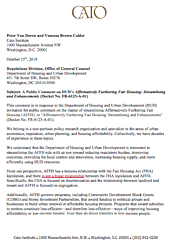We belong to a non-partisan policy research organization and specialize in the areas of urban economics, regulation, urban planning, and housing affordability. Collectively, we have decades of experience in these topics.
We understand that the Department of Housing and Urban Development is interested in streamlining the AFFH rule with an eye toward reducing regulatory burden, improving outcomes, providing for local control and innovation, increasing housing supply, and more efficiently using HUD resources.
From our perspective, AFFH has a tenuous relationship with the Fair Housing Act (FHA) legislation, and there is not a linear relationship between the FHA legislation and AFFH. Specifically, the FHA is focused on discrimination and the relationship between landlord and tenant and AFFH is focused on segregation.
Additionally, AFFH governs programs, including Community Development Block Grants (CDBG) and Home Investment Partnerships, that award funding to political groups and businesses to build urban renewal or affordable housing projects. Programs that award subsidies to entities constitute less-efficient — and therefore less-effective — ways of improving housing affordability or low-income tenants’ lives than do direct transfers to low-income people.



